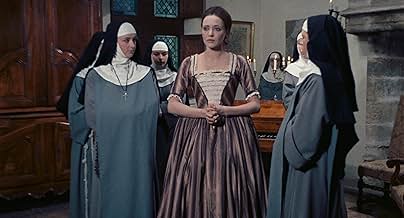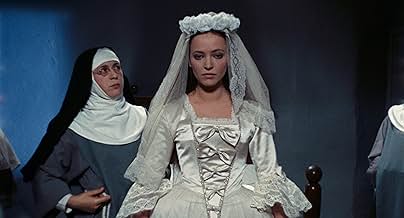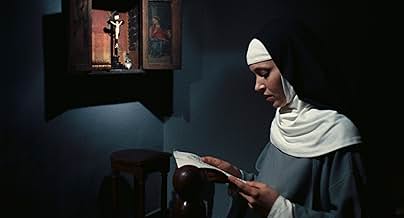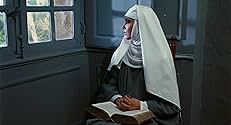IMDb RATING
7.5/10
3.4K
YOUR RATING
Suzanne is forced against her will to take vows as a nun and three mothers superior treat her in radically different ways. Suzanne's virtue brings disaster to everyone.Suzanne is forced against her will to take vows as a nun and three mothers superior treat her in radically different ways. Suzanne's virtue brings disaster to everyone.Suzanne is forced against her will to take vows as a nun and three mothers superior treat her in radically different ways. Suzanne's virtue brings disaster to everyone.
- Director
- Writers
- Stars
- Awards
- 2 nominations total
- Director
- Writers
- All cast & crew
- Production, box office & more at IMDbPro
Featured reviews
Although Jacques Rivette was labeled "new wave","la religieuse" is actually an austere work,a bit academic,very close to the pre-new wave generation,very close to Jean Delannoy.By far ,one of the two most palatable works by highbrow Rivette (the other one being the umpteenth version of Joan of Arc,thanks to Sandrine Bonnaire's portrayal).Needless to say ,all other Rivette works are "intellectual" works ,reserved for the happy(?) few ,and they will make yawn your head off.
"La religieuse" caused a big scandal when it was released in the mid-sixties.The Church insisted on calling the movie "Suzanne Simonin ,la religieuse de Diderot".
Released with a PG 18, the movie seems harmless today:yes there's a lesbian nun ,but the crowds have seen worse since.It's a jansenist work,with a very slow pace,faithful to Diderot's novel-which anyway depicted an improbable situation:they did not lock the girls in nunneries anymore ,it was a thing of the past in the XVIII th century-,except for the ending ,but Rivette's one makes sense all in all.
The cinematography is beautiful and anti-nouvelle vague,the actresses convincing:Micheline Presles,a saint of a nun,Anna Karina, her cruel mother's unfortunate victim,and Liselotte Pulver,a bon vivant character who's got a crush on Suzanne .
"La religieuse" caused a big scandal when it was released in the mid-sixties.The Church insisted on calling the movie "Suzanne Simonin ,la religieuse de Diderot".
Released with a PG 18, the movie seems harmless today:yes there's a lesbian nun ,but the crowds have seen worse since.It's a jansenist work,with a very slow pace,faithful to Diderot's novel-which anyway depicted an improbable situation:they did not lock the girls in nunneries anymore ,it was a thing of the past in the XVIII th century-,except for the ending ,but Rivette's one makes sense all in all.
The cinematography is beautiful and anti-nouvelle vague,the actresses convincing:Micheline Presles,a saint of a nun,Anna Karina, her cruel mother's unfortunate victim,and Liselotte Pulver,a bon vivant character who's got a crush on Suzanne .
Playing a role that few people thought would ever fit her and shadowed by vultures predicting disaster, Liselotte Pulver delivered the surprise coup of many a cinematic season in the icily directed 'La Religieuse'.
Ms. Pulver, the beloved eternal comedienne of the German cinema, has taken on that most daunting role: the lesbian Mother Superior, the ultimate debauched nun in the ultimate 'Why was the Revolution necessary?' tale, Denis Diderot's grand tale 'La Religieuse'. Working against type and expectation under the direction of Jaques Rivette, Ms. Pulver has created the most complex and compelling portrait of her long career, and she has done this in ways that deviate radically from her former screen roles.
Ms. Pulver's Mother Superior, emerges in this adaptation with her monumental weakness intact. But something new and affecting is simmering within the character, a damning glimpse of self-awareness. You get the sense that if her frantic movement stops for a second, she'll deflate into a small and bitter creature.
In films like 'Die Züricher Verlobung' and 'Das Wirtshaus I'm Spessart' Ms. Pulver's persona has always been that of a delectable waif, a vulnerable creature with a heart of gold. Here she was cast against type and rumors went that she did not get along with Mr. Rivette. And then, halfway through the film, there she was, and for the first time in her long career she didn't look remotely like an ingénue.
Ms. Pulver's portrait is so intimate and persuasive that you aren't allowed to step back and think, 'What a monster she is.' That's because, thanks to this actress's willingness to turn herself and her character inside out, you've been inside her mind. What a sad and fascinating place it is.
Ms. Pulver, the beloved eternal comedienne of the German cinema, has taken on that most daunting role: the lesbian Mother Superior, the ultimate debauched nun in the ultimate 'Why was the Revolution necessary?' tale, Denis Diderot's grand tale 'La Religieuse'. Working against type and expectation under the direction of Jaques Rivette, Ms. Pulver has created the most complex and compelling portrait of her long career, and she has done this in ways that deviate radically from her former screen roles.
Ms. Pulver's Mother Superior, emerges in this adaptation with her monumental weakness intact. But something new and affecting is simmering within the character, a damning glimpse of self-awareness. You get the sense that if her frantic movement stops for a second, she'll deflate into a small and bitter creature.
In films like 'Die Züricher Verlobung' and 'Das Wirtshaus I'm Spessart' Ms. Pulver's persona has always been that of a delectable waif, a vulnerable creature with a heart of gold. Here she was cast against type and rumors went that she did not get along with Mr. Rivette. And then, halfway through the film, there she was, and for the first time in her long career she didn't look remotely like an ingénue.
Ms. Pulver's portrait is so intimate and persuasive that you aren't allowed to step back and think, 'What a monster she is.' That's because, thanks to this actress's willingness to turn herself and her character inside out, you've been inside her mind. What a sad and fascinating place it is.
one of films who reflects inspired vision about Diderot's novel and high performances. one of the most impressive roles for Ana Karina and touching science for explore the detail for Liselotte Pulver. a film as puzzle of delicate nuances. subtle, cruel, delicate, precise, touching. and surprising for the atmosphere and for the image. reflecting the spirit of a period, it becomes a gem. for the grace and for the cruelty. for the vulnerability of each character and for the force of the lead character. for the beauty of image. and for the art of Jacques Rivette to use a theme in the most convincing manner. a film about freedom. and the fight for it.
As the ruthless Diana Monti in Georges Franju's 'Judex' (1963), Francine Berge (soon to be seen in Philippe Garrel's forthcoming 'La Lune Cravee') had attempted to abduct virginal young heroine Jacqueline Favreaux (played by Edith Scob) while disguised as a nun. Three years later it's now Anna Karina she has in her clutches as the cruel Sister Sainte-Christine.
As it reels from one abuse scandal to the next the last thing the Catholic Church needs right now is the timely revival of this harrowing reminder of the sheer relentless boredom and awfulness of convent life over two centuries earlier into which young women were often cast for financial rather than spiritual reasons. Especially as we now know the church was still pursuing it's abuse of the vulnerable even as it waged a furious campaign to suppress this film on it's initial appearance back in the sixties.
An incongruously sumptuous-looking production in widescreen & colour from one of the most austere directors of the Nouvelle Vague, the film is of course vastly enhanced by the melancholy beauty of Anna Karina in the title role and by the ever delightful Lilo Pulver as the sapphist Mother Superior of a rollicking and worldly convent that closely resembles Castle Anthrax in 'Monty Python and the Holy Grail'.
As it reels from one abuse scandal to the next the last thing the Catholic Church needs right now is the timely revival of this harrowing reminder of the sheer relentless boredom and awfulness of convent life over two centuries earlier into which young women were often cast for financial rather than spiritual reasons. Especially as we now know the church was still pursuing it's abuse of the vulnerable even as it waged a furious campaign to suppress this film on it's initial appearance back in the sixties.
An incongruously sumptuous-looking production in widescreen & colour from one of the most austere directors of the Nouvelle Vague, the film is of course vastly enhanced by the melancholy beauty of Anna Karina in the title role and by the ever delightful Lilo Pulver as the sapphist Mother Superior of a rollicking and worldly convent that closely resembles Castle Anthrax in 'Monty Python and the Holy Grail'.
During the 17th and 18th centuries it appears to have been quite common in Catholic countries for young women to be forced to enter convents against their will; this is, for example, the fate of one character in Manzoni's "The Betrothed", written in 1827 but set around 200 years earlier. "La Religieuse" by Denis Diderot is another work of literature which deals with the same problem. The main reason for this phenomenon was economic; although many convents required a "dowry" from prospective entrants, this was generally less than the amount of the dowry needed to attract a suitable husband, and once the girl had taken her vows the family no longer had any responsibility for her upkeep. In the case of Diderot's heroine Suzanne Simonin, however, there is another problem. She is the offspring of an extra-marital affair and her mother's husband is not her biological father. Suzanne's mother, therefore, resolves to shut her daughter up in a convent, partly because she believes that this will prevent her husband from discovering the truth, partly because the presence of the girl in the family home is a constant reminder of her adulterous affair, about which she now has a guilty conscience.
The film follows the unhappy Suzanne's life as a nun. It falls into three sections, corresponding to the three Mothers Superior under whom she serves. The first, Madame de Moni, is a kindly woman who knows that Suzanne has only entered into the religious life with great reluctance and does her best to make the girl's life bearable. When de Moni dies, however, the new Mother Superior, the fanatical and puritanical Sister Sainte-Christine takes a dislike to Suzanne, whom she sees as rebellious, treating her harshly, whipping her, putting her on a diet of bread and water, and forbidding the other nuns to have anything to do with her. (Sainte-Christine is also referred to by her family name, Madame de Tourmont, a name probably chosen because of its similarity to "tourment", French for "torment").
With the assistance of a sympathetic lawyer, Suzanne asks to be released from her vows, on the grounds that she was forced to become a nun against her will. This application is unsuccessful, but at least she is transferred to another convent. Sainte-Christine is reprimanded by the Bishop for her treatment of Suzanne, but is not otherwise punished. This change in Suzanne's fortunes, however, is not necessarily for the better. Whereas Sainte-Christine's regime was characterised by an excess of religious zeal, life in the new convent is marked by an almost total lack of it. The nuns pay only the bare minimum of attention to their religious observances, spending most of their time in gossiping, eating and drinking and frivolous entertainments. Suzanne is befriended by the Mother Superior Madame de Chelles, who despite her elevated rank is a gay (in the original sense), light-hearted young woman, not much older than Suzanne herself. What the naive Suzanne fails to realise is that her new friend is also gay in the modern sense of the word and is offering her rather more than platonic friendship.
There are some excellent performances, from Anna Karina as the naïve but spirited Suzanne, Liselotte Pulver as the hypocritical de Chelles, Francine Bergé as Sainte-Christine and Francisco Rabal as Dom Morel, a priest who offers to help Suzanne but might also have self-serving motives. For a French movie this one is surprisingly international- Karina was Danish, Pulver Swiss and Rabal Spanish. Another important role is played by the German Wolfgang Reichmann.
When this film was made in 1966 it was promptly banned by the French authorities. It might have been the swinging sixties in the Anglo-Saxon world, but De Gaulle's France was a surprisingly conservative place. The authorities objected to what they saw as a disrespectful attitude to the Catholic Church, even though the action takes place 200 years in the past and the events depicted are fictitious ones. The film, however, is not particularly erotic; in Diderot's novel Suzanne and de Chelles actually end up in bed together- the younger girl is too innocent to realise what is happening to her- but this scene is omitted from the film.
The decision to omit this scene was, I think, the correct one, as "La Religieuse" was not made as a soft-porn fantasy but as a serious examination of three different types of religious hypocrisy, that of de Chelles, that of Suzanne's parents and that of Sainte-Christine, whose treatment of Suzanne owes more to an innate sadism than it does to genuine religious fervour. The serious nature of the film is emphasised by the austere look which director Jacques Rivette brings to it. Most of the action takes place in enclosed rooms, giving it a claustrophobic feel, and the predominant colour is the grey of the convent walls and of the nuns' habits. The moral climate in France gradually became more liberal, the ban was soon lifted and today "La Religieuse" can be seen as a major work of the French cinema. 8/10
The film follows the unhappy Suzanne's life as a nun. It falls into three sections, corresponding to the three Mothers Superior under whom she serves. The first, Madame de Moni, is a kindly woman who knows that Suzanne has only entered into the religious life with great reluctance and does her best to make the girl's life bearable. When de Moni dies, however, the new Mother Superior, the fanatical and puritanical Sister Sainte-Christine takes a dislike to Suzanne, whom she sees as rebellious, treating her harshly, whipping her, putting her on a diet of bread and water, and forbidding the other nuns to have anything to do with her. (Sainte-Christine is also referred to by her family name, Madame de Tourmont, a name probably chosen because of its similarity to "tourment", French for "torment").
With the assistance of a sympathetic lawyer, Suzanne asks to be released from her vows, on the grounds that she was forced to become a nun against her will. This application is unsuccessful, but at least she is transferred to another convent. Sainte-Christine is reprimanded by the Bishop for her treatment of Suzanne, but is not otherwise punished. This change in Suzanne's fortunes, however, is not necessarily for the better. Whereas Sainte-Christine's regime was characterised by an excess of religious zeal, life in the new convent is marked by an almost total lack of it. The nuns pay only the bare minimum of attention to their religious observances, spending most of their time in gossiping, eating and drinking and frivolous entertainments. Suzanne is befriended by the Mother Superior Madame de Chelles, who despite her elevated rank is a gay (in the original sense), light-hearted young woman, not much older than Suzanne herself. What the naive Suzanne fails to realise is that her new friend is also gay in the modern sense of the word and is offering her rather more than platonic friendship.
There are some excellent performances, from Anna Karina as the naïve but spirited Suzanne, Liselotte Pulver as the hypocritical de Chelles, Francine Bergé as Sainte-Christine and Francisco Rabal as Dom Morel, a priest who offers to help Suzanne but might also have self-serving motives. For a French movie this one is surprisingly international- Karina was Danish, Pulver Swiss and Rabal Spanish. Another important role is played by the German Wolfgang Reichmann.
When this film was made in 1966 it was promptly banned by the French authorities. It might have been the swinging sixties in the Anglo-Saxon world, but De Gaulle's France was a surprisingly conservative place. The authorities objected to what they saw as a disrespectful attitude to the Catholic Church, even though the action takes place 200 years in the past and the events depicted are fictitious ones. The film, however, is not particularly erotic; in Diderot's novel Suzanne and de Chelles actually end up in bed together- the younger girl is too innocent to realise what is happening to her- but this scene is omitted from the film.
The decision to omit this scene was, I think, the correct one, as "La Religieuse" was not made as a soft-porn fantasy but as a serious examination of three different types of religious hypocrisy, that of de Chelles, that of Suzanne's parents and that of Sainte-Christine, whose treatment of Suzanne owes more to an innate sadism than it does to genuine religious fervour. The serious nature of the film is emphasised by the austere look which director Jacques Rivette brings to it. Most of the action takes place in enclosed rooms, giving it a claustrophobic feel, and the predominant colour is the grey of the convent walls and of the nuns' habits. The moral climate in France gradually became more liberal, the ban was soon lifted and today "La Religieuse" can be seen as a major work of the French cinema. 8/10
Did you know
- TriviaDespite being approved by the Censorship Board the film's theatrical release was initial blocked by the Minister of Information.
- GoofsSuzanne plays and sings the song "Plaisir D'Amour". The final title card identifies the time and place as 'Paris, 1760', but the song was not composed until 1785.
- Quotes
Monsieur Hébert: Your superior will shortly be told in the name of Sister Marie-Suzanne Simonin of a protest against her vows with a request to leave religious life and leave the cloister to live her life as she sees fit.
- ConnectionsFeatured in Deux de la Vague (2010)
- How long is The Nun?Powered by Alexa
Details
- Release date
- Country of origin
- Official sites
- Languages
- Also known as
- Redovnica
- Filming locations
- Production companies
- See more company credits at IMDbPro
Box office
- Gross US & Canada
- $30,245
- Opening weekend US & Canada
- $6,273
- Jan 6, 2019
- Gross worldwide
- $32,659
- Runtime
- 2h 14m(134 min)
- Sound mix
- Aspect ratio
- 1.85 : 1
Contribute to this page
Suggest an edit or add missing content

![Watch Bande-annonce [OV]](https://m.media-amazon.com/images/M/MV5BZjIxOTRkY2ItNjJkOS00ZWMwLWFkM2UtY2FmYzU4NTIyNWQ2XkEyXkFqcGdeQXRodW1ibmFpbC1pbml0aWFsaXplcg@@._V1_QL75_UX500_CR0)































